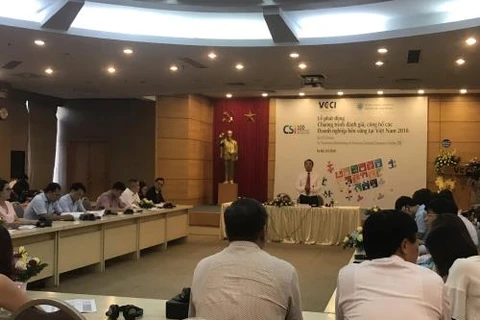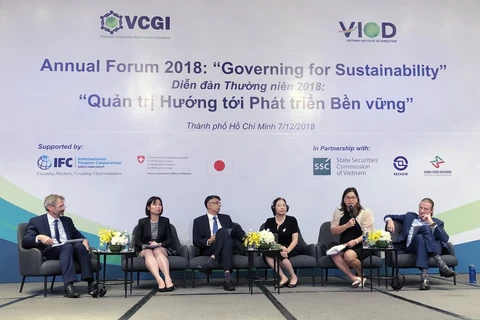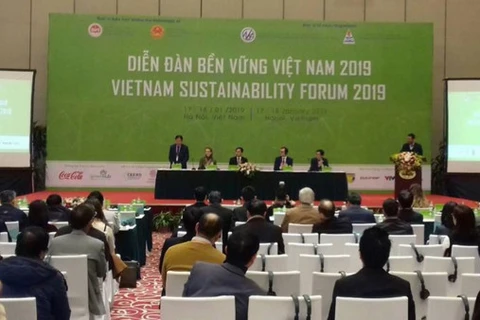Hanoi (VNA) – The Ministry of Planning and Investment is collecting opinions on a draft study report proposing the inclusion of the Sustainable Development Goals (SDGs) in the socio-economic development strategy for 2021 – 2030 of Vietnam.
This will also be a legal basis for the country to realise its commitments to the international community, responsibly contribute to global efforts towards sustainable development, and create a driving force for Vietnamese businesses to enhance their competitiveness, build brand names, and integrate into the global market of free trade.
Sustainable development is forecast to remain a common trend around the world in the next 10 years. As a member of the United Nations, Vietnam has been striving to achieve the SDGs.
Ensuring economic growth
The 17 global SDGs have been nationalised into 115 targets for Vietnam in its national action plan for implementation of the 2030 Agenda for Sustainable Development.
The Vietnamese Government pledged to summon every resource and mobilise the participation of all ministries, sectors, localities, organisations and people to successfully carry out the 2030 Agenda and the SDGs.
Dao Dinh Tan, Deputy Director of the Department of Science, Natural Resources and Environment under the Ministry of Planning and Investment, said in the recent past, the viewpoint on sustainable development has been consistently integrated into the socio-economic development strategy for 2011 – 2020 and the socio-economic development plan for 2016 – 2020 of the country. To successfully realise the SDGs, it is very important to further integrate the SDGs into development strategies and plans for future periods.
In July, the UN Sustainable Development Solutions Network and the Bertelsmann Stiftung foundation of Germany released the fourth annual report on the SDGs implementation progress, which assessed the SDGs implementation outcomes of 162 countries and territories around the world. Vietnam rose three places to the 54th position in the rankings.
More and more enterprises in the country have realised the importance of sustainability and considered this vital to their existence. Green and clean production and business is currently one of the strategic targets of many companies amidst global economic integration.
Meeting integration requirements
Vietnam has taken part in a number of free trade agreements such as the Comprehensive and Progressive Agreement for Trans-Pacific Partnership (CPTPP) and the EU – Vietnam Free Trade Agreement (EVFTA). In this context, not only export products but goods sold in the domestic market must also meet new requirements of consumers who now prefer environmentally friendly items and producers with good social responsibility and sustainable operations.
Nguyen Phuong Son, Director of the external relations division at Amway Vietnam, said if businesses consider economic profits as their sole target, they will be unable to develop sustainably. They need to contribute to society and join hands in dealing with social issues.
 Nguyen Phuong Son, Director of the external relations division at Amway Vietnam, talks about businesses' sustainability (Photo: Vietnamplus)
Nguyen Phuong Son, Director of the external relations division at Amway Vietnam, talks about businesses' sustainability (Photo: Vietnamplus) Making a corporate social responsibility report in a methodological manner will help enterprises demonstrate their serious business performance, respect for consumers and efforts towards sustainable development, he noted, adding that by doing so, their trademarks will be highly valued by consumers, which in turn will help promote their competitiveness in the global market.
To achieve sustainability, all relevant parties in the supply chain, not only producers, have to pay attention to solutions for harmonising economic growth and sustainable development. Businesses should also capitalise on scientific advances to effectively use natural resources and technology, and develop high-quality products and services, Son said.
Matt Wilson, an executive of Heineken Vietnam, said in the recent past, this company has provided support for 20 member companies of the Vietnam Business Council for Sustainable Development and organised training on sustainable development, including the application of the circular economy model, for more than 100 suppliers.
When applying the circular economy model in a creative manner, enterprises will be able to not only optimise their operations but also strengthen their competitiveness, he added./.

























